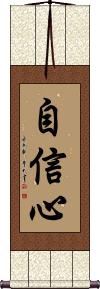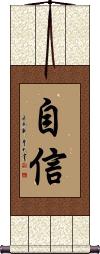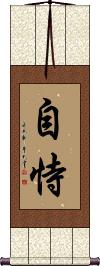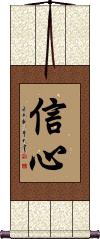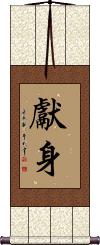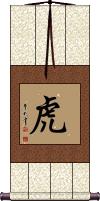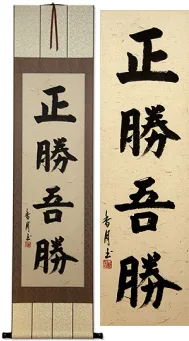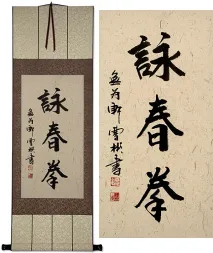Many custom options...
And formats...

Self-Confidence in Chinese / Japanese...
Buy a Self-Confidence calligraphy wall scroll here!
Personalize your custom “Self-Confidence” project by clicking the button next to your favorite “Self-Confidence” title below...
Self-Confidence
自信心 is the long title for self-confidence.
It differs from the other version, only with the addition of the character for heart or soul at the end. With that addition, you could say this means a self-confident heart.
See Also: Confidence
Self-Confidence
自信 is created by simply putting the character for “faith/believe/confidence” with the character for “oneself” in front of it.
The literal translation holds the same meaning in English, Chinese, and Japanese.
It's like a self-affirmation to say, “you can do it.”
Some may also use this to mean self-esteem or a sense of self-worth. 自信 is also how to say “believe in oneself.”
See Also: Confidence
Self-Reliance
自恃 means self-reliance but is often used to mean self-confidence or the state of being self-assured.
Basically, this means you can rely on yourself (with a slight suggestion that others can rely on you as well).
The first character means “oneself,” while the second means “to rely upon.”
See Also: Confidence | Self-Confidence
Confidence / Faithful Heart
信心 is a Chinese, Japanese, and Korean word that means confidence, faith, or belief in somebody or something.
The first character means faith, and the second can mean heart or soul. Therefore, you could say this means “faithful heart” or “faithful soul.”
In Korean especially, this word has a religious connotation.
In the old Japanese Buddhist context, this was a word for citta-prasāda (clear or pure heart-mind).
In modern Japan (when read by non-Buddhists), this word is usually understood as “faith,” “belief,” or “devotion.”
See Also: Self-Confidence
Engage with Confidence
理直氣壯 is a Chinese proverb that means “to do something while knowing you’re in the right.”
This can also be translated as and is appropriate when you are:
“In the right and self-confident”
“Bold and confident with justice on one's side”
“Having the courage of one's convictions”
“Justified and forceful”
“To be confident and vigorous because reason and logic are on one's side”
“Justified and confident”
Sacrifice / Devotion / Dedication
(complete bodily devotion)
獻身 is used to describe being so devoted to something that you will make sacrifices for that goal/thing/person.
You can also translate this word as any of the following:
Sacrifice one's life for...
To dedicate oneself to...
Self-devotion
Dedication
Devote to...
Self-sacrifice
Giving your whole body to...
This can be a dedication to or for someone but is often used as a dedication or making sacrifices for your country, public service, or a cause. For instance, an Olympic athlete makes great sacrifices to train in his/her sport for their country and compatriots.
![]()
![]() While the form shown to the upper-left is considered an ancient Japanese version, in modern Japan, they use the simplified version of the first Kanji (shown to the right). Click on the Kanji at the right instead of the button above if you want this modern Japanese version.
While the form shown to the upper-left is considered an ancient Japanese version, in modern Japan, they use the simplified version of the first Kanji (shown to the right). Click on the Kanji at the right instead of the button above if you want this modern Japanese version.
If you are looking for a more religious meaning of devotion, see Faith.
See Also: Confidence | Dedication
Tiger
Year of the Tiger / Zodiac Sign
虎 is the character for tiger in Chinese, old Korean Hanja, and Japanese Kanji.
Since you already know what a tiger is, here's some trivia: If you look at the Japanese pronunciation, you might remember a movie called “Tora Tora Tora” which was the code word used to initiate the attack on Pearl Harbor. It simply means “Tiger Tiger Tiger.”
In Chinese culture, the tiger is considered to be the king of all animals (in much the way we see the lion in western culture).
From the Chinese Zodiac, if you were born in the year of the tiger, you . . .
Have a strong personality.
Are full of self-confidence.
Love adventure
Don't like to obey others.
See also our Chinese Zodiac or Tiger Calligraphy pages.
This in-stock artwork might be what you are looking for, and ships right away...
Gallery Price: $200.00
Your Price: $122.88
Gallery Price: $60.00
Your Price: $36.88
Gallery Price: $60.00
Your Price: $36.88
Gallery Price: $60.00
Your Price: $36.88
Gallery Price: $60.00
Your Price: $36.88
Not the results for self-confidence that you were looking for?
Below are some entries from our dictionary that may match your self-confidence search...
| Characters If shown, 2nd row is Simp. Chinese |
Pronunciation Romanization |
Simple Dictionary Definition |
自信 see styles |
zì xìn zi4 xin4 tzu hsin jishin じしん |
More info & calligraphy: Self-Confidenceself-confidence; confidence (in oneself); (surname) Jishin |
自信心 see styles |
zì xìn xīn zi4 xin4 xin1 tzu hsin hsin |
More info & calligraphy: Self-Confidence |
不惑 see styles |
bù huò bu4 huo4 pu huo fuwaku ふわく |
without doubt; with full self-confidence; forty years of age past forty; following right course |
自負 自负 see styles |
zì fù zi4 fu4 tzu fu jifu じふ |
conceited; to take responsibility (n,vs,vi) pride; self-confidence; thinking highly of oneself; being proud of one's abilities or achievements |
意気地 see styles |
ikuji(p); ikiji いくじ(P); いきじ |
self-respect; self-confidence; guts; backbone; pride; drive; willpower |
自負心 see styles |
jifushin じふしん |
pride; self-confidence; self-esteem; self-conceit |
自信喪失 see styles |
jishinsoushitsu / jishinsoshitsu じしんそうしつ |
(noun/participle) loss of (self-)confidence; inferiority complex |
自信満々 see styles |
jishinmanman じしんまんまん |
(adj-na,adj-no,adj-t,adv-to) (yoji) full of confidence; brimming with (self-)confidence; having great faith in oneself |
自信満満 see styles |
jishinmanman じしんまんまん |
(adj-na,adj-no,adj-t,adv-to) (yoji) full of confidence; brimming with (self-)confidence; having great faith in oneself |
Variations: |
jishinmanman じしんまんまん |
(adj-na,adj-no,adj-t,adv-to) full of confidence; brimming with (self-)confidence; having great faith in oneself |
Variations: |
ikuji(p); ikiji いくじ(P); いきじ |
self-respect; self-confidence; guts; backbone; pride; drive; willpower |
Variations: |
ikuji(p); ikiji いくじ(P); いきじ |
self-respect; self-confidence; guts; backbone; pride; drive; willpower |
The following table may be helpful for those studying Chinese or Japanese...
| Title | Characters | Romaji (Romanized Japanese) | Various forms of Romanized Chinese | |
| Self-Confidence | 自信心 | zì xìn xīn zi4 xin4 xin1 zi xin xin zixinxin | tzu hsin hsin tzuhsinhsin |
|
| Self-Confidence | 自信 | jishin | zì xìn / zi4 xin4 / zi xin / zixin | tzu hsin / tzuhsin |
| Self-Reliance | 自恃 | zì shì / zi4 shi4 / zi shi / zishi | tzu shih / tzushih | |
| Confidence Faithful Heart | 信心 | shin jin / shinjin | xìn xīn / xin4 xin1 / xin xin / xinxin | hsin hsin / hsinhsin |
| Engage with Confidence | 理直氣壯 理直气壮 | lǐ zhí qì zhuàng li3 zhi2 qi4 zhuang4 li zhi qi zhuang lizhiqizhuang | li chih ch`i chuang lichihchichuang li chih chi chuang |
|
| Sacrifice Devotion Dedication | 獻身 献身 | ken shin / kenshin | xiàn shēn xian4 shen1 xian shen xianshen | hsien shen hsienshen |
| Tiger | 虎 | tora | hǔ / hu3 / hu | |
| In some entries above you will see that characters have different versions above and below a line. In these cases, the characters above the line are Traditional Chinese, while the ones below are Simplified Chinese. | ||||
Successful Chinese Character and Japanese Kanji calligraphy searches within the last few hours...
